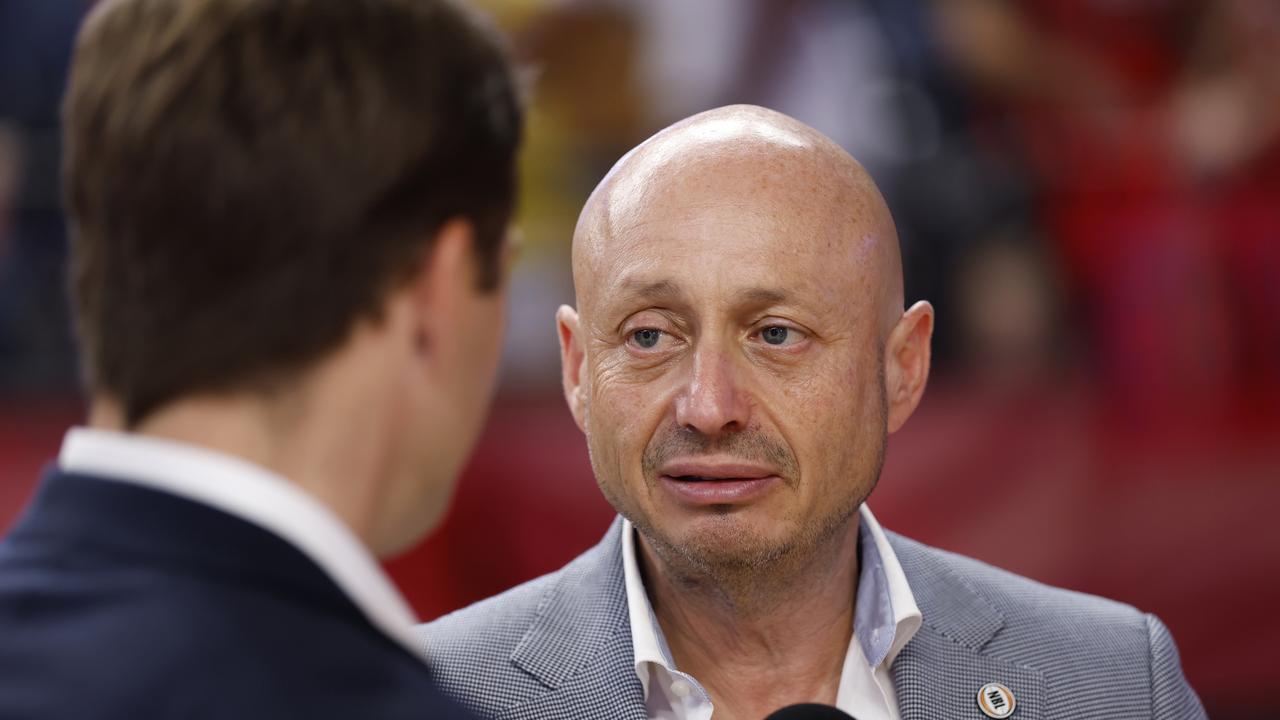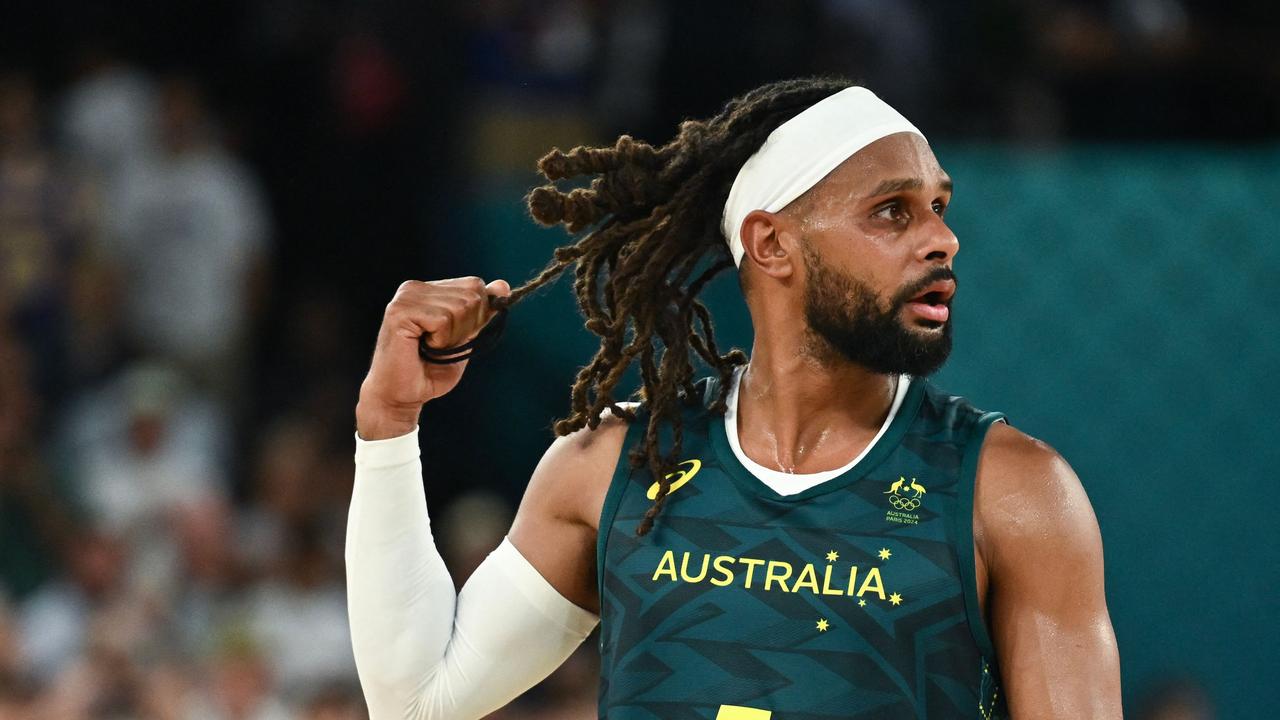Crosscourt special: NBL boss David Stevenson opens up on ref abuse, expansion, a ‘festival of basketball’ and the potential for a trade period
While we all wonder where the next NBL club in Australia is, is the league looking to expand its borders? Michael Randall chats with NBL CEO David Stevenson.
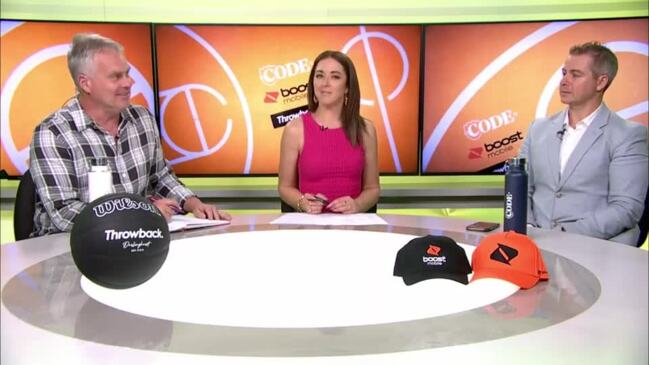
NBL Scores and News
Don't miss out on the headlines from NBL Scores and News. Followed categories will be added to My News.
There is non-stop talk about where the next NBL club will be in Australia — but what about an international team joining the national league?
The Gold Coast hosted the NBL Blitz and is seen as a strong contender, NBL boss David Stevenson was in Darwin recently to explore options there, a second Sydney team continues to firm and there are parties interested in almost every state and territory.
But could the next club be outside Australia?
SCROLL DOWN FOR THE LATEST ON PLANS FOR A GATHER ROUND-STYLE FESTIVAL OF BASKETBALL, NBL REF TREATMENT AND THE POTENTIAL FOR A MID-SEASON TRADE PERIOD
It’s no secret league owner Larry Kestelman and Co are doing everything they can to crack the lucrative Asian market and, while it’s probably a long shot that the next club is offshore, Crosscourt can reveal the NBL has entered discussions with parties in at least three different countries — Japan, Indonesia and the Philippines.
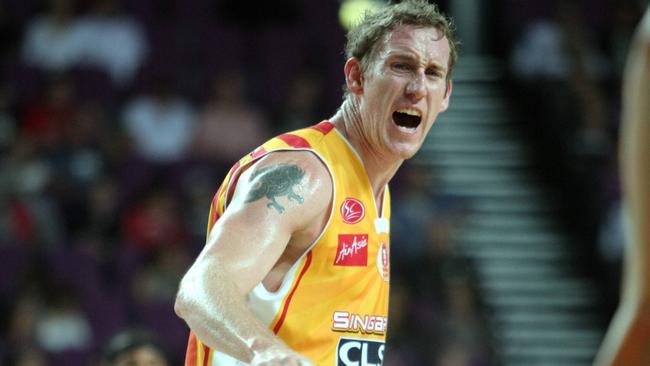
It’s the first tangible indicator the NBL is deadly serious about taking the league global and, while Stevenson would not be drawn on the sensitive discussions, he confirmed Asia was the “logical international destination” due to its favourable time zone, travel distance and interest in the sport.
Large parts of Stevenson’s 17 years working with global giant Nike involved postings in Asia, including Hong Kong and China, giving him an intimate knowledge of the market.
“Having spent a lot of time living there, I’ve experienced it first hand that Australian basketball is viewed very highly across Asia, both in terms of the quality of the NBL league but also Australian players and coaches and high performance people, given the success of the Boomers and the Opals.
“We’ve got an aspirational position within basketball in Asia.
“We don’t want to rush into this — we did see the (Singapore) Slingers come and go pretty quickly (2006-08) so we want to make sure that, if this does progress, then it’s going to be a strong and sustainable model that has a long term home.
“There’s a lot of water to go under the bridge, given there’s a lot of complexity around how we would do that but what we do know is if you crack that code (in Asia), the opportunities are pretty sizeable.
“We’re having some active conversations and we’ll see how that plays out.”
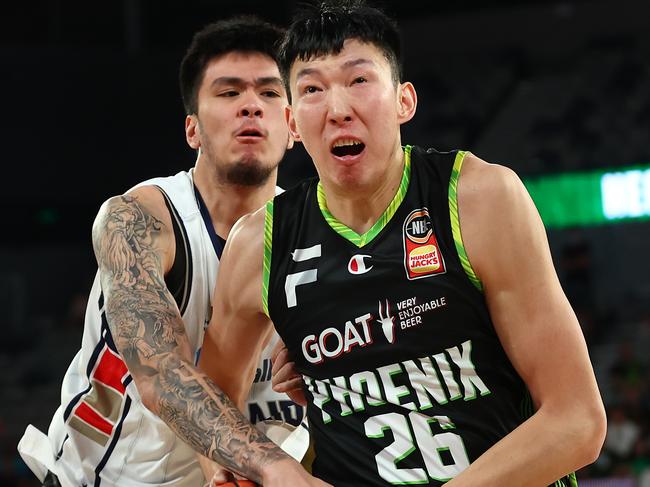
Kestelman wants the 10-team league to grow to 12 by 2026, with parties from Perth, Melbourne, Sydney, Canberra, Newcastle, Townsville and Darwin expressing interest in securing a licence.
But Stevenson cautioned the league won’t “expand for expansion’s sake”.
“We see a great opportunity and it’s not just in one place, we can certainly see an expansion agenda that would see multiple cities over the coming years,” he said.
“But we’ve got to have three boxes checked and that’s fan interest, strong corporate support and then government support, particularly from a facilities perspective, both playing and training.
“Until you get those three boxes ticked then these conversations remain ongoing.
“It might take us a bit longer to expand but we want to make sure that, when we do put a team in, it’s going to be strong and successful from day one.”
NBL CEO DEMANDS BETTER TREATMENT FOR REFS
NBL chief executive David Stevenson has drawn a public line in the sand over the treatment of the league’s referees.
Stevenson, who joined the NBL in July has attended games at every venue in the league this season, said the one thing he’s noticed is coaches, players and fans “pushing the boundaries” in their interactions with the whistleblowers.
“This is something I feel very strongly about and I want to be clear that I will have zero tolerance for abuse of referees, full stop,” Stevenson said.
“It’s an emotional game and we understand and we want to continue that emotion from everyone, but I’m not going to put up with abuse of referees.
“I’ve just started to see a little bit that I don’t feel comfortable with.”
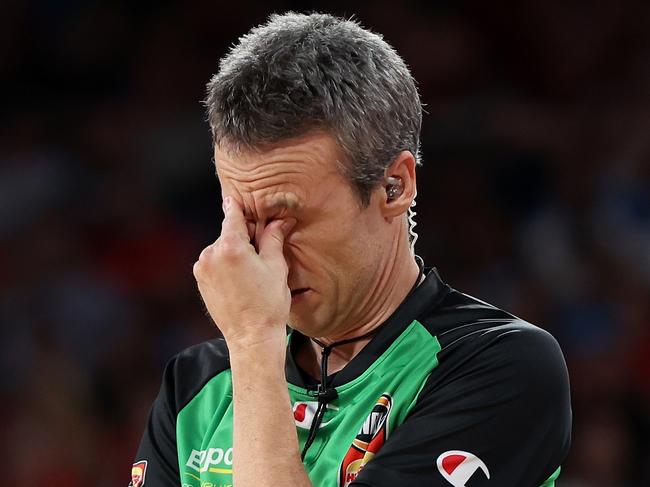
Referees have come under fire on a number of occasions this season but Stevensons said NBL internal statistics show their accuracy is at almost 90 per cent through eight rounds.
“I think referees are in an incredibly difficult and tough environment, every call they make gets analysed, both internally and externally,” he said.
“I’ve got full faith and confidence in (refs boss) Scott Butler and our referee and officiating team because they do a fantastic job — there’s not a lot of parts of our game that people are at 90 per cent accuracy.”
The scrutiny on decision makers hit fever pitch during a round 6 foul fest, prompting some to query if the officialdom had been instructed to blow the whistle more.
Across eight games, 345 fouls were called at an average of over 43 per game. Three of those games featured more than 50 fouls, with a season-high 61 called in the Melbourne United v Perth Wildcats overtime thriller — which led to 79 free throws. The league did admit a mistake on one foul that was missed that might have robbed United of victory.
But Stevenson rubbished any assertion the referees had been given instruction to call more fouls or tighten their interpretations.
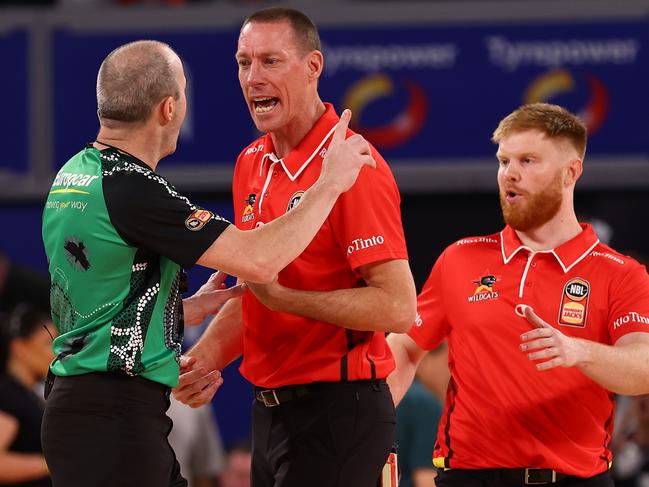
“There was nothing specific and I know it might seem hard to get your head around, but there was no special edict that went out to referees in that round or following that round,” he said.
“We always look at the data and there’s some rounds, throughout history, where there are a lot more fouls called.
“Some if it comes down to human nature, the way you make some of those calls just looks different in some games than it does from others, but it’s not something we go out and change guidelines every week, because that would be incredibly hard for players and coaches to adjust to.”
Stevenson said his warning comes with the broader view of the game as a whole.
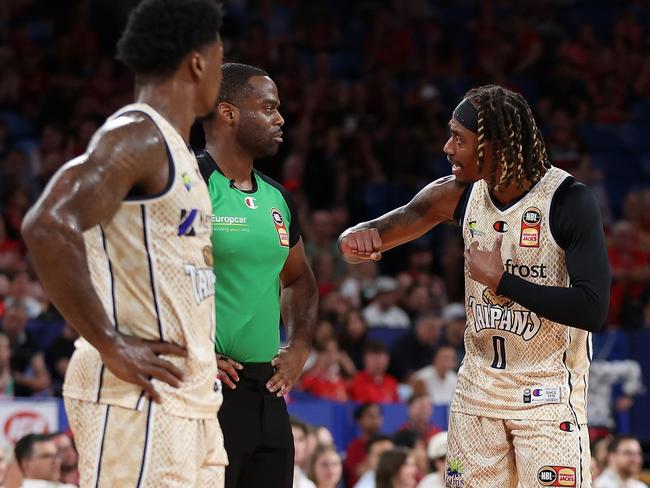
“All of our community players look at these interactions and, as soon as they see those interactions that are disrespectful or abusive, that gives people in community basketball permission to say, ‘Well, that’s OK, that’s the way you interact with the referees’ and that’s not OK,” he said.
“It’s something that discourages people who might be considering becoming referees and that then makes it harder to recruit.
“The games can’t happen without referees, so we’ve got to make sure we attract and retain the best referees and, to do that, we’ve got to put them in an environment where they can be at their best.
“I want to make sure they’re fully supported and that the message is clear for everyone, whether that be fans, players, coaches, clubs: our referees are sacrosanct and I won’t tolerate any abuse.”
TIME FOR BASKETBALL TO UNITE, OWN CALENDAR
The NBL and Basketball Australia are working together to create a Festival of Basketball concept that has the potential to be a turbocharged week-long answer to the AFL’s Gather Round.
NBL chief executive David Stevenson and Basketball Australia boss Matt Scriven want a ‘flagpole moment’ where basketball became imprinted in the national psyche, similar to cricket on Boxing Day, the Australian Open in the last two weeks of January and the AFL grand final on the last Saturday in September.
“Basketball has that chance to own the public’s attention for one time a year,” Stevenson, who was in Adelaide on Friday to meet with South Australian Premier Peter Malinauskas and other key government stakeholders to discuss the concept, said
“What’s the moment where basketball can own the calendar?
“It’s an exciting festival concept, a new idea, and we’ve been working collaboratively with Matt Scriven.
“This is a joint effort, it’s a cool way to think about the power of basketball coming together and we will continue to speak to the different states about their interest and the best way forward.”
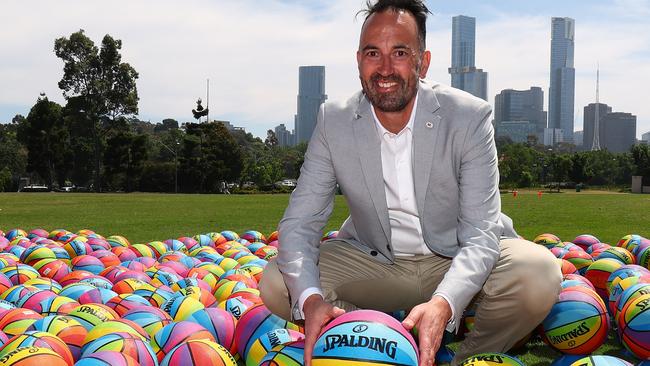
Scriven said BA moved its U14 National Championships from Casey to Sydney to coincide with the FIBA Women’s World Cup and that was a resounding success, with players from the Opals and the junior tournament able to attend each others’ games.
That could happen on a larger scale if all NBL and WNBL clubs were based in the same city as the nationals event.
“We have the opportunity to partner with NBL to really take over a whole city and have this hub and spoke model where you’ve got games playing in local association stadiums and then NBL and WNBL games in main arenas and then events going on around that.
“You bring together the grassroots and the elite, integrate coaches and officials with fan zones and participation and it becomes a whole-of-sport concept.”
Here’s what a Basketball Festival could look like:
-NBL games
-WNBL games
-Junior tournaments, including the potential of a Junior National Championships
-3x3 tournament
-NBA input
-NBA 2K tournaments
-Business of basketball conference
-Black-tie event
-Other basketball related events and themes
Stevenson was one of the key figures in the establishment of the AFL’s Gather Round but, unlike Australian rules, which is overseen by the AFL from grassroots through to elite levels, Stevenson believes a the festival could unite the fragmented sport and allow it to “own the calendar” for a week around the same time every year.
“If you take a step back, one of our biggest challenges as a code is that we’re quite fragmented — the NBL has the men’s elite competition, you’ve got WNBL run by Basketball Australia, you’ve got participation and high performance Boomers and Opals run by BA, you’ve got NBA that plays an important role and they do a lot of things here in Australia, you’ve got the states and the local associations — they’re all doing a great job but all as different organisations with different needs and requirements,” he said.
“The big focus, for me, is ‘how we unify the sport?’.”
TRADE PERIOD TO SPICE UP NBL?
They call the AFL trade period the season after the season when interest hits fever pitch as names, big and small, swap clubs.
Crosscourt, last week, put an NBL in-season trade window on the agenda, floating a number of hypothetical transactions that could help clubs — and players — this season.
NBL boss David Stevenson loves the idea — but acknowledges there are significant barriers to it becoming a reality.
“We love that idea of creating more opportunities for fans to get excited during the season and for clubs who may have had injuries or players who aren’t getting opportunities to make changes and get better,” Stevenson said.
“But there’s also a lot of logistic challenges with that when you’re talking about moving people and families and kids’ schools and jobs and houses, there’s a lot of complexity in it.”
Pre-NBL24, a new, two-year collective bargaining agreement was struck between the NBL and Australian Basketball Players’ Association.
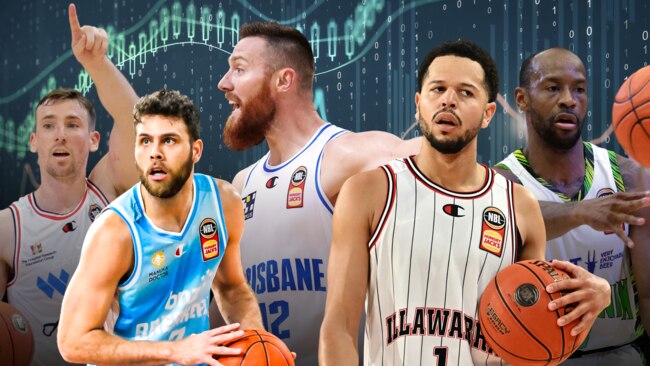
There was no provision for a trade period, but Stevenson said there have been discussions with both the ABPA and clubs on its potential.
“It’s something that we’ll keep talking about with both the clubs and the ABPA but that change isn’t imminent,” Stevenson said.
“We’re always talking about ways in which we can drive better outcomes for the players and clubs and how we can drive interest in the game from a fan’s point of view.”
Stevenson said salary cap considerations and player contracts would also need to be scrutinised to make the concept work.
“There’s always interest from coaches of basketball programs about how they can get better but it all comes down to the mechanics,” he said.
“What’s that impact on the salary cap? How do you make sure you can support the players with those logistic challenges? How long’s the contracting period?
“The devil’s in the detail.”
Crosscourt contacted ABPA boss Jacob Holmes for comment but he did not respond before deadline.
More Coverage
Originally published as Crosscourt special: NBL boss David Stevenson opens up on ref abuse, expansion, a ‘festival of basketball’ and the potential for a trade period




